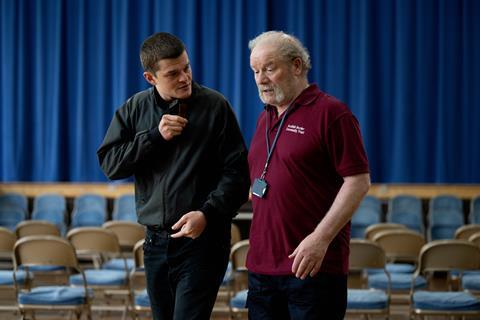Kirk Jones directs this stirring biopic of Davidson, previously the subject of documentaries including ‘John’s Not Mad’

Dir/scr: Kirk Jones. UK. 2025. 121mins
It’s tough to be a teenager. It’s even more difficult to be a teenager in a small Scottish border town – and more challenging still to be one living with Tourette’s Syndrome at a time when the neurological disorder was barely recognised as a condition, let alone understood. That was the reality faced by John Davidson, who developed Tourette’s at 14 and found his entire life forever changed. While this stirring dramatization of Davidson’s life hits conventional narrative beats, sensitive handling and a remarkable central performance from Robert Aramayo do heartwarming justice to a remarkable life.
Does heartwarming justice to a remarkable life
Written and directed by Kirk Jones (behind other such crowd-pleasers as My Big Fat Greek Wedding 2 and Nanny McPhee) I Swear premieres in Toronto and will be released in the UK on October 10. It is likely to do best on home soil, but the universality of this condition could well help it travel. At the very least, it marks Aramayo (Antebellum, The Lord Of The Rings: The Rings Of Power) out as a major big-screen talent.
It’s the early 1980s in the small Scottish town of Galashiels, and adolescent John (Scott Ellis Watson) has little on his mind other than football and girls. When he starts to develop physical and verbal tics, which cause him to swear and lash out uncontrollably, he is met with scorn and punishment. His headteacher lashes his hands; his mother Heather (Shirley Henderson) makes him eat his meals on the living room floor. John is diagnosed with Tourette’s at 14, but that brings with it no magic cure.
The film chooses to jump forward 13 years, so we don’t see John receive his diagnosis, his difficult time at school, the aftermath of his parents’ divorce. There’s no mention of the 1989 BBC documentary, John’s Not Mad, which followed a 16-year-old John, although footage does play during the end credits. (Four follow-up documentaries also aired between 2002 and 2016.) Instead, Jones’s screenplay picks up the story when John (now played by Aramayo) is in his late 20s, still living at home and largely resigned to his lot. It’s at this point that John meets Dottie (an excellent Maxine Peake), the mental health nurse mother of an old school friend, and, with her patient help, begins to find the confidence to come out from behind the shadow of his condition.
Davidson is credited as an executive producer and has clearly worked closely with the filmmakers to create an authentic representation of his life. The narrative, which largely takes place between the late 1990s and present day, unsurprisingly focuses on key incidents that have the most dramatic impact: John being arrested by the police for his uncontrollable swearing; beaten with a crowbar for inadvertently insulting a girl; hauled to court for accidentally lashing out at someone in a club; getting his first job.
The abuse John faces is upsetting but well-handled; that most of it stems from ignorance of his condition is never used as justification or excuse. As John’s less-than-supportive mother, Henderson gives a nuanced performance that speaks to the exhaustion and exasperation that come from caring for someone with Tourette’s – although it’s also clear that she chose not to educate herself in any real way. Elsewhere, some moments highlight the unavoidable humour in some of John’s ill-timed tics – blurting out that he has ejaculated in his tea during a job interview, for example – but, crucially, they never make John the butt of the joke. He himself recognises the funny side of his condition, often using humour as a way to connect with those around him.
Some may wonder why the film cast Aramayo, a man who does not live with Tourette’s, to play this role. Questions of representations aside, Aramayo gives an incredible turn as John, clearly having worked hard to research the condition so that his tics come across as entirely natural rather than as any kind of performance. Outside of the physical demands of the role, Aramayo captures the anxiety and sadness of this gentle man, who has both accepted who he is and understands the limitations it brings to his life. Tourette’s has shrunk his world, and cinematographer James Blann captures the intimacy of this small-town location; the welcoming interior of Dotty’s home, the community centre where John finally gets a job as a caretaker alongside gruff, kindly Tommy (an endearing Peter Mullan) who becomes a key ally.
It’s Tommy who encourages John to find the courage to use his condition as an educational tool, to start talking to other young people with Tourette’s. That extends to lectures in schools and meetings with the police, and ends with John receiving an MBE from the Queen in 2019. An early scene which sees John shout ‘Fuck The Queen’ in the silence of this austere setting is, as with the rest of the film, jaw-dropping and completely true.
Production companies: Tempo Productions, One Story High
International sales: Bankside, yana@bankside-films.com
Producers: Piers Tempest, Kirk Jones, Georgina Bayliff
Cinematography: James Blann
Production design: Sabrina Linder
Editing: Sam Sneade
Music: Stephen Rennicks
Main cast: Robert Aramayo, Peter Mullan, Maxine Peake, Shirley Henderson, Scott Ellis Watson















![[L-R]: Amanda Villavieja, Laia Casanovas, Yasmina Praderas](https://d1nslcd7m2225b.cloudfront.net/Pictures/274x183/6/4/1/1471641_pxl_20251224_103354743_618426_crop.jpg)








